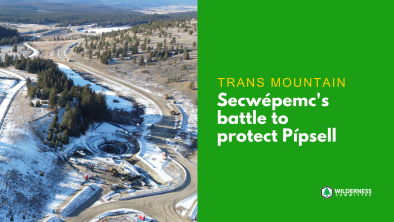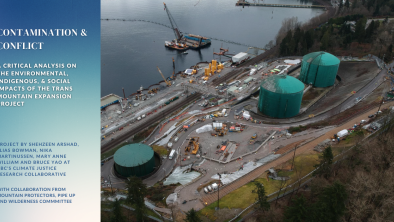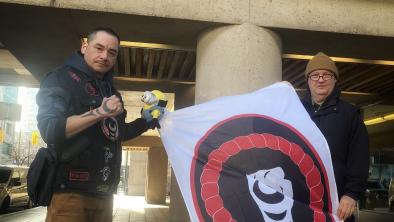We are all 'directly affected' by the Kinder Morgan pipeline
Huffington Post BC
By Eoin Madden
The story of why we all have a stake in Kinder Morgan's proposal to build a mega-pipeline through our communities begins in 2011, with strategy documents exchanged between federal agencies, the Canadian Association of Petroleum Producers (CAPP) and other oil lobbyists. It listed those considered friends and foes of their campaign to prevent oil from the tar sands from being labelled and taxed as more environmentally destructive than other types of oil.
As an "ally" of the oil industry, the strategy document listed the National Energy Board (NEB), the supposedly "independent" regulator of oil and gas infrastructure projects in Canada. Media, environmental groups and First Nations were identified, not surprisingly, as "adversaries."
The document was released as part of a Freedom of Information request by Climate Action Network, and triggered alarm bells for all who had previously believed in the NEB's ability to make an impartial and unbiased decision on whether or not building extensive fossil fuel infrastructure is in our best interests.
Soon afterwards in 2012, Canadian laws governing the public's ability to have a say in such decisions were dramatically altered in the most undemocratic of ways: the legislative changes were sunk deep within an omnibus budget bill entitled "Bill C-38."
Why did the federal government of Canada feel that it needed to hide these changes from us? Because it was a smash and grab of our fundamental democratic rights, and the public's right to participate in regulatory processes was the golden prize. Public participation in environmental assessments results in better decisions and better protection for our climate, our water, species at risk and our communities.
In effect, our right to participate in environmental reviews was restricted by a new requirement placed on each and every one of us -- we are now being forced to prove that we are directly affected by Kinder Morgan's pipeline proposal, or demonstrate that we have specific information of use to the NEB.
The term "directly affected" is narrowly defined by the NEB and is restricted to those of us whose economic or physical well-being is threatened by the project, but not those who are concerned about climate change, the tar sands or the broader impact to British Columbia's environment.
There's a strong sense of irony that emerges for me in that interpretation: there is no greater cost to our economy than ignoring climate change and the massive burden it will put on us if we continue building fossil fuel infrastructure. And world health agencies make similar claims about the ongoing and expected effects that climate change will have on our health.
The reason why I believe we are all directly affected by the Kinder Morgan proposal is simply based on what we are losing to it. We are losing an open and independent democratic system of governance that was once an example to the world. We are losing the ability to hand down a liveable climate to our children.
We are losing vital protection from a catastrophic tar sands oil spill, the type of spill that Kalamazoo, Michigan has taught us is virtually unrepairable. We are losing the ability to exist comfortably in our communities, without the intimidation of oil-fueled politics and the threat of spills. In short, we are losing all that matters.
The window for applications to participate in the Kinder Morgan pipeline hearings will be shut by the NEB next Wednesday, Feb. 12. These are applications to "intervene" in the hearings, which will provide groups and individuals with the right to make oral submissions to the NEB -- should your application be successful. At the very least, successful applicants can submit a written letter of comment.
At this point, municipalities such as Burnaby, Port Moody, Surrey, Vancouver, North Vancouver and the District of West Vancouver have all made their applications to intervene. Some First Nations, as well as environmental groups such as the Wilderness Committee, have also applied.
There has never been a more important time for us to exercise our democratic right to participate in conversations like these, to decide whether or not enormous fossil fuel projects like Kinder Morgan's are built. These decisions will have profound implications for the health of our local environment and the global climate, and we all deserve a seat at the table.
Information about how to apply can be found here, and should you find the process intimidating, please contact us for support.


